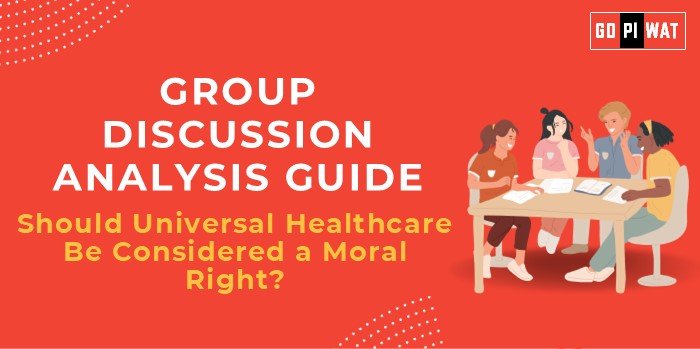📋 Group Discussion (GD) Analysis Guide: Should Universal Healthcare Be Considered a Moral Right?
🌍 Introduction to the Topic
Opening Context:
Universal healthcare is a recurring topic in global ethical and political debates, especially in nations striving to balance economic growth with social welfare.
Topic Background:
The concept of universal healthcare stems from the idea that health is a fundamental human need. Rooted in principles of equity and justice, it has been endorsed by the World Health Organization as a key determinant of sustainable development. The pandemic has further highlighted its urgency.
📊 Quick Facts and Key Statistics
- 🌍 Global Coverage Gap: 50% of the world lacks access to essential health services (WHO, 2023).
- ⏳ Life Expectancy and Healthcare Access: Countries with universal healthcare, like Japan and Norway, report life expectancies of 84+ years.
- 💰 Economic Impact: Universal healthcare systems can reduce national healthcare expenditure by up to 10% (OECD, 2022).
- 🦠 Pandemic Highlight: COVID-19 revealed systemic inequities, with low-income populations facing higher mortality due to healthcare inaccessibility.
👥 Stakeholders and Their Roles
- 🏛️ Governments: Primary drivers of policy and funding for universal healthcare systems.
- 🏥 Healthcare Providers: Deliver equitable care and advocate for systemic reforms.
- 🌐 International Organizations: WHO and UN promote universal health coverage through technical support and policy guidance.
- 🧑🤝🧑 Citizens: Demand and sustain systems through civic engagement and taxes.
🏆 Achievements and Challenges
Achievements:
- ✅ Nordic Models: Universal healthcare in Norway and Sweden has led to high public satisfaction and life expectancy.
- 🌟 India’s Ayushman Bharat: Over 500 million individuals gained access to basic health coverage.
- 📈 Economic Resilience: Nations with robust health systems recover faster from health crises.
Challenges:
- ⚠️ Funding: Many countries face fiscal limitations in sustaining universal healthcare.
- 📉 Inequality: Access gaps persist, particularly in rural or marginalized communities.
Global Comparisons:
- 🇯🇵 Success: Japan’s efficient healthcare system ensures low out-of-pocket expenses.
- 🇺🇸 Struggles: The U.S. remains a notable exception with fragmented coverage despite high healthcare expenditure.
Case Study:
🌏 Thailand’s Universal Health Coverage Scheme: Reduced out-of-pocket expenses from 33% to 12% in two decades.
📄 Structured Arguments for Discussion
- 💡 Supporting Stance: “Healthcare is a basic human right; universal coverage ensures equity and national health security.”
- ⚔️ Opposing Stance: “Mandating universal healthcare strains economic resources and can lead to inefficiencies.”
- ⚖️ Balanced Perspective: “While universal healthcare aligns with moral values, its implementation must balance equity with economic sustainability.”
🗣️ Effective Discussion Approaches
Opening Approaches:
- 📊 Statistical Start: “Half the world lacks essential healthcare—shouldn’t addressing this be a moral imperative?”
- ⚖️ Ethical Lens: “If life is invaluable, should access to healthcare be dependent on income?”
Counter-Argument Handling:
- ✅ Acknowledge concerns about costs and inefficiencies.
- 🤝 Offer evidence of successful models like Thailand and Nordic nations.
🔍 Strategic Analysis of Strengths and Weaknesses
- ✅ Strengths: Promotes equity, improves public health outcomes, and reduces long-term costs.
- ⚠️ Weaknesses: Requires substantial financial investment and strong governance.
- 💡 Opportunities: Leverage technology to make systems cost-effective.
- ⚡ Threats: Political opposition and economic crises may derail progress.
💼 Connecting with B-School Applications
Real-World Applications:
- 📊 Explore its financial implications in healthcare management, insurance, or policymaking.
Sample Interview Questions:
- 💬 “Can universal healthcare be cost-effective in developing economies?”
- 💬 “What role can public-private partnerships play in healthcare access?”
Insights for B-School Students:
- 📚 Analyze healthcare policies as part of corporate social responsibility and sustainable development initiatives.


